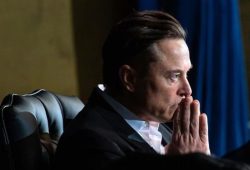
Tesla has announced a new compensation plan that will grant CEO Elon Musk 96 million shares of restricted stock, valued at approximately $29 billion. This decision comes merely six months after a Delaware court ordered the company to revoke Musk’s previous multi-billion dollar pay package.
In a regulatory filing, Tesla specified that Musk must pay $23.34 per share of restricted stock as part of this arrangement. This exercise price mirrors the 2018 CEO Performance Award terms, the same controversial compensation plan that a Delaware judge had struck down in a shareholder lawsuit.
ALSO READ. Tesla loses brand loyalty after Elon Musk’s support for Trump
Why did the court initially revoke Elon Musk’s 2018 pay package?
The legal battle over Musk’s compensation began when a Tesla shareholder challenged the 2018 CEO pay package, which had a potential maximum value of $56 billion, dependent on Tesla’s stock performance. Chancellor Kathaleen St. Jude McCormick, presiding over the case, ruled that Musk had orchestrated “sham negotiations” with Tesla’s board members, undermining the legitimacy of the agreement.
In December 2024, McCormick reaffirmed her decision, ordering Tesla to rescind the pay package. Simultaneously, she denied plaintiff attorneys’ request for over $5 billion in legal fees, approving instead a fee award of $345 million.
Despite this ruling, Musk appealed in March, and by April, Tesla’s board announced the formation of a special committee to review Musk’s compensation as CEO.
ALSO READ. Trump’s tariffs drive iPhone panic sales
Why does Tesla’s board believe Musk deserves a new pay package?
In a letter addressed to shareholders, Tesla’s board defended the new compensation plan, emphasizing that Musk has not received any “meaningful compensation” in the last eight years. The board highlighted Musk’s “transformative and unprecedented growth” contributions, which, they stated, have “translated into immense value generated for Tesla and all our shareholders.”
Board members Robyn Denholm and Kathleen Wilson-Thompson reiterated this sentiment: “Despite these legal challenges, we can all agree that Elon has achieved the unprecedented and transformative growth required to meet all the milestones of the 2018 CEO Performance Award.”
Musk, who does not receive a salary or cash bonus from Tesla, earns through stock option awards, which allow him to buy Tesla shares at a discounted price. Currently, he owns around 13% of Tesla’s outstanding stock, making him the company’s largest individual shareholder.
How have Tesla’s shareholders reacted to Musk’s new compensation plan?
The announcement has stirred mixed reactions among Tesla investors. On one hand, analysts like Dan Ives of Wedbush believe this move could stabilize Tesla’s leadership and calm shareholder anxieties. “We believe this grant will now keep Musk as CEO of Tesla at least until 2030 and removes an overhang on the stock,” Ives wrote in a client note, adding that “Musk remains Tesla’s big asset.”
On the other hand, a group of over 20 Tesla shareholders expressed concern about Musk’s increasing involvement in politics, which they argue has diverted his attention from Tesla’s core business. This group recently demanded Tesla comply with Texas state laws by holding an annual shareholders meeting, scheduled for November.
How has Musk’s political involvement impacted Tesla’s stock performance?
Tesla’s stock has been under considerable pressure in 2025, dropping 25% year-to-date. A significant portion of this decline is attributed to Musk’s political affiliations, particularly his prominent role in Donald Trump’s administration and his advocacy for policies aimed at shrinking the federal government.
Musk’s political activities have sparked protests at Tesla dealerships and led to a backlash from environmentally conscious consumers. Furthermore, Trump’s domestic policy agenda eliminated key EV tax credits and regulatory incentives, further straining Tesla’s revenue streams.
What financial challenges is Tesla currently facing?
Tesla reported a sharp decline in profits during its most recent quarter, with net income plunging from $1.39 billion to $409 million. Revenue also dropped, and the company failed to meet Wall Street’s already-lowered expectations. These financial strains, coupled with intensifying competition from Detroit automakers and Chinese EV manufacturers, have raised investor concerns about Tesla’s future trajectory.
To address growing shareholder pressure, Tesla’s board scheduled its annual meeting for November. The board hopes the approval of Musk’s new pay package will signal long-term stability despite the company’s ongoing challenges.
⇒ SUBSCRIBE TO OUR CONTENT ON GOOGLE NEWS










